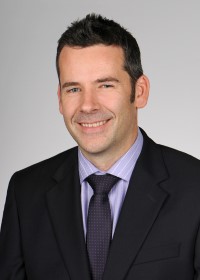Human Factors in Surgery: Shifting the Paradigm on Patient Safety
Kenneth Catchpole, Ph.D.
Professor of Human Factors
Vice Chair of Clinical Informatics
Department of Anesthesiology and Perioperative Medicine
Medical University of South Carolina

“Human factors engineering in clinical settings is still relatively rare. AHRQ funding has enabled me to teach my team this way of thinking and send them out into the real world.”
Surgical errors contribute to more than 4,000 annual “never events”—shocking medical errors, such as wrong-site surgery, that should never occur. Kenneth Catchpole, Ph.D., Professor of Human Factors in the Department of Anesthesiology and Perioperative Medicine at the Medical University of South Carolina (MUSC), aims to develop evidence-based strategies to prevent surgical harm. His work involves analyzing how staff work within existing processes and redesigning them to help surgical teams improve patient safety.
“A human factors approach helps address human error by examining systemic causes rather than blaming individuals,” Dr. Catchpole said. An endowed chair in clinical practice and human factors at MUSC, he was inspired by problems identified through his close relationship with the MUSC safety team. AHRQ funding has helped Dr. Catchpole study strategies to improve anesthesia medication delivery, robotic surgery integration, and sterilization and decontamination of surgical instruments by reviewing the work systems within which surgical teams operate.
Although surgical site infections account for nearly 1.7 million healthcare-acquired infections annually, Dr. Catchpole quickly discovered that minimal research had been conducted on the sterile processing department—the area in the hospital where devices used in surgical procedures are cleaned, sterilized, and stored. In 2017, he received a 1-year grant from AHRQ to review decontamination practices at a 700-bed medical system. From scrub techs failing to perform point-of-use reprocessing due to time pressures to limited space and low lighting that resulted in fatigue and injuries, Dr. Catchpole’s research identified 30 potential sources of workflow failures that could be corrected with changes to processes. In addition, his work provided a framework for potential interventions to be explored in future research.
Dr. Catchpole’s commitment to ensuring that his findings would lead to systemic changes that make healthcare safer led him to another AHRQ grant. In 2018, he developed a Patient Safety Learning Laboratory. The project, Identifying and Reducing Errors in Perioperative Anesthesia Medication Delivery , focuses on reducing the 200,000 to 20 million anesthesia-related medication injuries that occur annually in the United States. The multidisciplinary team is using a combination of innovative techniques, approaches, and perspectives across simulated and real environments to address these types of medication injuries, “one of the most frequent, costly, and under-researched threats to safety in acute care,” according to Dr. Catchpole. Through this learning laboratory, Dr. Catchpole found that adopting graphical methods, such as icons, may be an effective way to convey information and increase readability. “Icons are valuable for visibility in the operating room and increase legibility of labels while providing information at a glance; [it’s] a small intervention that may have a significant impact on reducing medication delivery failures in the operating room,” said Dr. Catchpole. The project is expected to end in 2023.
In 2018, Dr. Catchpole received another AHRQ grant to expand his research into robotic-assisted surgery. That project, Human Factors and Systems Integration in High Technology Surgery, explores the root causes of errors that occur during robotic-assisted surgery. Dr. Catchpole noted, “There is a lot of focus on the surgeon—the training of the surgeon, the abilities of the surgeon—but a lot less focus on the other factors, particularly the operating room staff and this big robot, that combine to make robotic-assisted surgery successful.” Dr. Catchpole describes his research into robotic surgery and creation of gamified, competitive training as his favorite AHRQ-supported success story. The project is expected to end in 2023.
Dr. Catchpole received another AHRQ grant in 2021 to expand upon his initial sterile processing project. Sterile processing departments directly affect productivity, efficiency, safety, and infection control in acute interventional care. As described by Dr. Catchpole, about 15 percent of surgical instrument trays have missing, broken, or dirty instruments. His current project aims to develop interventions, improve data-analytic approaches, and study administrative decision-making across multiple sterile processing departments. He describes this project as “the largest program of research into sterile processing ever conducted, because nobody has ever done it this way.” This project ends in 2026.
Beyond his direct research, Dr. Catchpole credits AHRQ funding with helping him share the value of human factors engineering through his own work and the training he has imparted to his teams. “We’re changing the clinical thinking about what errors really mean, about what systems really mean, and what we can do to avoid harm in the future,” he said.
Dr. Catchpole also serves as an Adjunct Professor in the Department of Engineering at Clemson University. He is a member of the Anesthesia Patient Safety Foundation Scientific Evaluation Committee and the Society of Cardiovascular Anesthesiologists’ Quality & Safety Leadership Committee. Dr. Catchpole also is a member of the AHRQ Healthcare Safety and Quality Improvement Research Study Section Grant Review Panel.
Related AHRQ resources:
- AHRQ Safety Program for Improving Surgical Care and Recovery
- Surgery
- Toolkit to Promote Safe Surgery
- Toolkit to Improve Safety in Ambulatory Care Centers
Principal Investigator: Kenneth Catchpole, Ph.D.
Institution: Medical University of South Carolina
Grantee Since: 2017
Type of Grant: Various
Consistent with its mission, AHRQ provides a broad range of extramural research grants and contracts, research training, conference grants, and intramural research activities. AHRQ is committed to fostering the next generation of health services researchers who can focus on some of the most important challenges facing our Nation's health care system.
To learn more about AHRQ's Research Education and Training Programs, please visit https://www.ahrq.gov/training.



